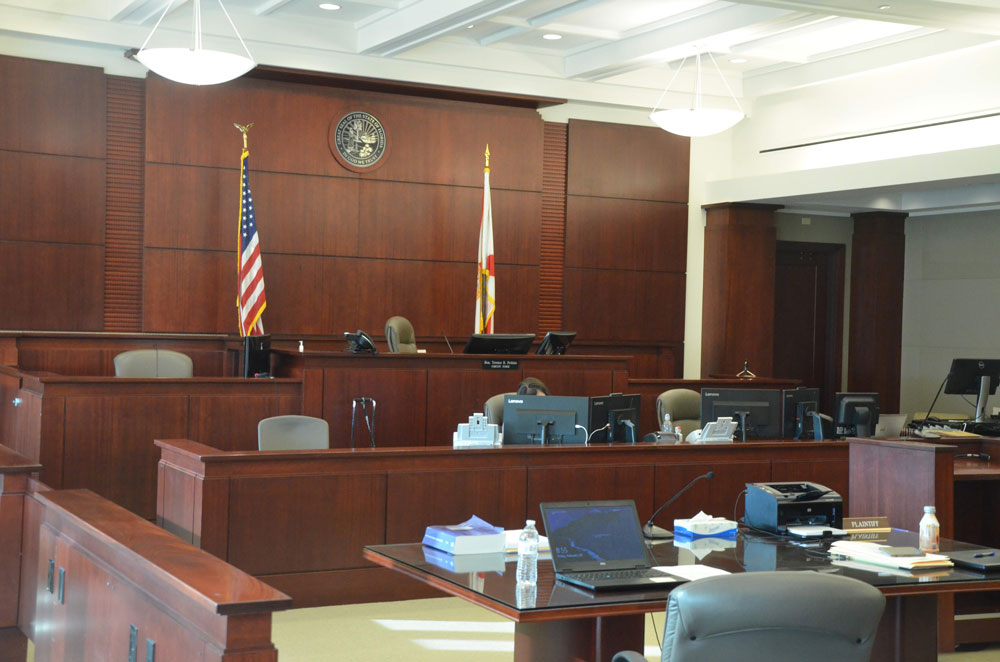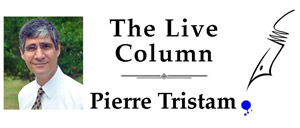Addiction Is Not a Crime. The Drug War Is. | Pierre Tristam - FlaglerLive.com
Addiction Is Not a Crime. The Drug War Is. | Pierre Tristam - FlaglerLive.com |
| Addiction Is Not a Crime. The Drug War Is. | Pierre Tristam - FlaglerLive.com Posted: 20 Feb 2021 09:36 AM PST   Every morning I check the court docket for cases worth reporting on. Almost every morning I'm repelled by the futility and embarrassed for the judges, the attorneys, the clerks, cops and especially the defendants who are humiliated through the judicial gauntlet at our expense over idiotic drug charges that don't belong in court. Most are for mere possession.
They're just the tip of the judicial iceberg. Every single one of these cases on Monday is a slice in time from a long and costly journey through the police and court system–the arrest and booking, involving a number of law enforcement personnel for hours, first appearance before a judge, the days and nights in jail, the bonding process if the defendant is fortunate to have the money, the drizzle of motions and counter motions by competing lawyers, endless notices to appear, each one taking up a clerk's time and resources, the arraignment, the discovery process–drafting lists of witnesses, sending out summonses, more notices to appear–the parade of pre-trial hearings, each one involving transporting the defendant to court (in non-covid times, anyway), bringing in the lawyers, the platoon of clerks and bailiffs, the colossal cost in time and money of taking depositions, transcribing depositions, reading and annotating depositions, then typically still more motions, more hearings, continuances, sometimes the call for expert witnesses, and if everyone but the defendant is lucky, if the system's vises and claws work as intended, a resolution before trial, a plea, a sentencing that, in effect, makes the previous Macchu Picchu of judicial steps pretty much pointless. It's not over. There are fines to be paid, jail or prison time to be served, though more often in these cases it's probation, which involves its own universe of officers, surveillance, warrantless searches, piss and polygraph tests, drug-offender counseling, violations of probation and further arrests, because probation is no picnic, and on again with the whole rigmarole described above. Escaping all that, even when the sentence has been served, there's the criminal record and all the humiliations and limitations on the person's life and work that entails. For possessing a joint. For possessing Oxycodone pills, a snort of cocaine, a bag of hash. Every possession. Every case. Every human being. Every one of them a Josef K. That's just one day in our county. One felony judge's docket. Multiply that by the dozen or so felony judges in our circuit. Multiply that by Florida's 20 circuits. Multiply that by 49 states. Flagler's docket on Monday is a microbe in a different kind of entirely man-made, and unpardonable pandemic. Or take Drug Court every Thursday, that theater of judicial indulgence that never tires of congratulating itself. Cut off from its context or compared to the current alternative, it can seem like a wonderful program. It's certainly well-meaning. It has its successes, in its own world. But it's a contradictory, fundamentally flawed initiative. Its participation standards are arbitrary. Participants are cherry-picked and limited by the small number of available slots. It relies on public shaming, punishment and rewards over months and sometimes years. The threat of expulsion and imprisonment always hangs over the addict. Expulsion has been fatal to three local participants in four years (Savannah DeAngelis, Anthony Fennick and Mason Brown).
Sure recidivism rates and costs are lower than if the defendant was only punished the more traditionally sadistic way. But that's only when you compare the rate to the police-state's side of the ledger. Treatment works better when cut off from legal threats and penalties. Yet drug court remains the crown jewel of the judicial system's narcotized scales because like the proud dweller in a squalid tenement, he can always point to the homeless hordes below. Drug court only looks good compared to the circles of hell below it, like Monday's docket: case after embarrassing case, reducing some of the most intelligent and admirable legal talent in the county to bit parts in the buffoonery of a drug war lost before Richard Nixon, no slouch of pathologies, declared it half a century ago. Federal and state lawmakers, the real source of the madness that followed, got to work weaponizing drug laws and building the foundations of the greatest mass-incarceration and judicial supervision complex in history, bar none: not even the Soviet's gulag in the 1950s or China's today compares. (We have nearly 7 million people in prisons and jail, on probation or parole, compared to 2.5 million in the Soviet gulags at their height. The Soviet gulags ended. Ours have not.)
Nevertheless most of those evangelists, including our own sheriff and state attorney, repeatedly say how "we're not going to arrest our way out of the crisis." They know it's not a criminal issue. They recognize that they should have no role in the matter. They know it's a medical issue, like alcoholism, like overeating, like any addictive behavior. Our addiction to the war on drugs included. Punishing the addicted is absurd. It's cruel, it's sadistic, and it's useless. It's a throwback to retributive justice to please the masses rather than help the individual. Criminal justice today shines compared to what it used to be. For centuries it was thought just to cut off the tongue of a son who disowns his father, to execute a robber, an adulteress, a homosexual or a corrupt government employee, to cut off hands and pluck out eyes for offenses that wouldn't be considered misdemeanors today. We're not just talking Hammurabi-Code follies here. In Virginia, none other than the author of the Declaration of Independence–a fan of Cesare Beccaria, the great reformist of crime and punishment–wrote a bill calling for the castration of sexually adventurous men and the drilling of noses of sexually adventurous women. The bill failed, but only because its opponents objected to Thomas Jefferson's wish to to limit capital punishment only to those convicted of murder and treason. It's been a slow trajectory, but we've learned to civilize our laws and debarbarize some of our punishments. Our drug laws are the exception. One of these days a great lawyer will win a case declaring the war on drugs unconstitutional on Eighth Amendment grounds. Considering our still-medieval attitudes on the subject, that day is far off. But there's a halfway house. Last Nov. 3 in Oregon, 58 percent of voters approved Measure 110, decriminalizing the possession of all drugs, including cocaine, heroin, meth, oxycodone and any other controlled substance. Manufacturing and trafficking is still criminal, as it should be, starting with some of our pharmaceutical companies and their marketing campaigns. But possession of small amounts is now punishable by a maximum fine of $100. No jail, no criminal record.
Oregon is an outlier in the United States. But Portugal has been doing this for 20 years. It decriminalized all drugs in 2001, when heroin and HIV were demolishing its social fabric. Drug users aren't given free rein. They don't go to jail anymore or have criminal records anymore, but they're channeled through a health system they must comply with. Most hard-drug users get medically-assisted therapy. Portugal now has the lowest rate of overdose deaths in Europe, other than Romania. Prison overcrowding ended. Courts' dockets and law enforcement's energies refocused on actual crimes worth prosecuting. Public defenders had more time to give those cases instead of wasting day after day arguing motions to suppress a three-penny drug users' errant statements during a traffic stop that turned into a drug arrest. Oregon expects the same results. We've tried it the other way for 50 years. It's not working. It's never worked. Prohibition two generations earlier had taught us it wouldn't work. We did it anyway. We continue to do it, hounding and marginalizing millions while millions profit off the mass-incarceration complex. Alternatives aren't a mystery. We have data and history, we have survivors and we have no excuses. To continue with our cruel and sadistic drug war is the daily crime. The only way out is to decriminalize, treat, repair and, somehow, atone for lawmakers' and the judicial system's half-century assault on their own citizens.
Pierre Tristam is FlaglerLive's editor. Reach him by email here. |
| You are subscribed to email updates from "polygraph definition" - Google News. To stop receiving these emails, you may unsubscribe now. | Email delivery powered by Google |
| Google, 1600 Amphitheatre Parkway, Mountain View, CA 94043, United States | |

Comments
Post a Comment